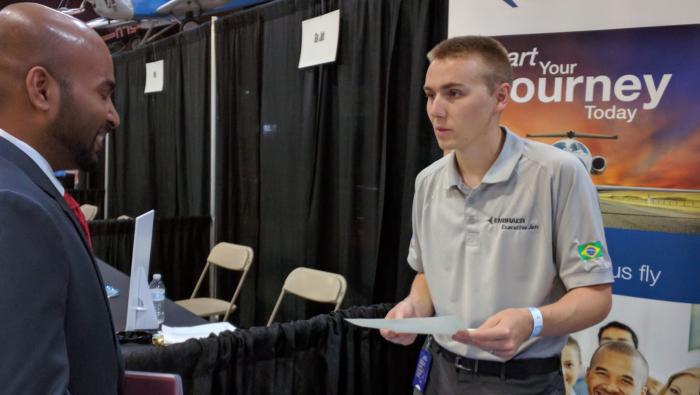Business jet and turboprop operators insured by Swiss Re Corporate Solutions (Booth No. N1121) can receive premium credits toward upset safety training through a new program announced here at NBAA. The program offers premium credits to qualifying jet and turboprop operators whose pilots complete the Upset Prevention and Recovery Training (UPRT) program offered jointly by aviation training companies CAE (Booth No. N3533) and Aviation Performance Solutions (APS, Booth No. N527).
“When you work with two leading edge training companies, from an insurance perspective, the equation is relatively simple,” said Oliver Dlugosch, head of global markets at Swiss Re Corporate Solutions. “If there’s better training offered to customers and customers go through the training, it reduces the overall risk and frequency of loss. If the frequency of loss is reduced, that’s good for the pilots, the traveling public and also for the insurance company. That’s why we want to offer an incentive to our customers to complete this advanced training.”
The APS/CAE UPRT program is designed to help pilots avoid, recognize and recover from loss of control in-flight (LOC-I) situations in which flight occurs outside of the normal flight envelope with an inability of the pilot to control the aircraft.
“Our program offers a credit toward specialized training that mitigates the threat of loss of control in-flight,” said Dlugosch. “Swiss Re Corporate Solutions is investing in the advancement of aviation safety with those insured and we will offer the credit to qualifying customers each year that they take the UPRT course with our partners in the program.”
The UPRT course includes a web-based Airplane Upset Recovery Training Aid, 4.5 in-flight upset training missions (flights four and five are combined into a longer mission) in an Extra 300 (U.S.) or a Slingsby T67M200 Firefly (Europe), 7.5 hours of specialized ground instruction, a one-hour jet-specific high performance briefing, and a two-hour CAE multi-engine glass cockpit full flight simulator upset-specific session with an expert APS upset instructor. Upset training in an A4 Skyhawk military jet is also available at APS for an additional fee.
“We consider this integrated program as one of the best solutions that we have available to the industry. It was specifically designed to address the needs of the professional jet pilot,” said APS president Paul Ransbury. “It’s a thoroughly vetted and proven program, but this is the first opportunity where it’s being brought to the market in a manner by which there is an opportunity for insurance clients to take advantage of financial credits.”
The entire UPRT course costs $6,850 per pilot. Upon completion of the three-day course, qualified operators insured by Swiss Re can apply for up to 10 percent credit of their gross premium to a maximum discount of $25,000.
“This program represents a triple win,” said Dlugosch. “Pilots get better training, training program providers get more participants and the insurance company lowers risk of losses.”
All training is done by APS instructors. Students may opt to complete the course at one of three locations where both APS and CAE have facilities in close proximity: Mesa, Ariz.; Dallas, Texas; and Amsterdam, Netherlands.
“CAE has been championing advanced training courses for years as a way to increase safety,” said Nick Leontidis, CAE group president of Civil Simulation Products. “Pilots who have taken our upset prevention and recovery training have said that this is one of the most valuable flying training programs they have ever received. We are pleased to participate with Swiss Re Corporate Solutions, and APS in a program that endorses innovative training.”
The Swiss Re Corporate Solutions credit program may be timely as the FAA recently finalized its new rulemaking for air transport pilot (ATP) certificate requirements that require candidates to complete upset recognition and recovery training in a full flight simulator. The new FAA rule, effective as of Aug. 1, 2013, also requires a second-in-command (SIC) pilot (first officer) on FAR Part 121 air carriers to hold an ATP certificate with the appropriate aircraft type rating. Previously first officers could hold a commercial certificate with instrument rating.







